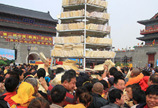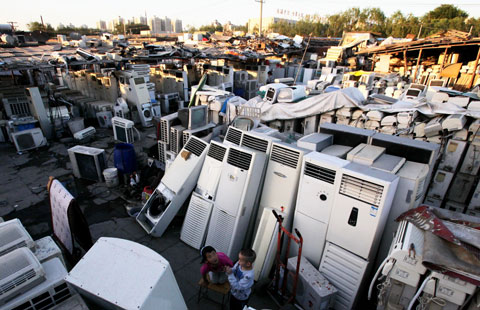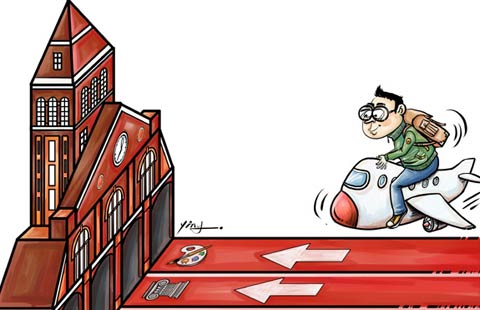Some foreign fast food is harder to swallow
By Zhang Yuchen (China Daily) Updated: 2011-08-15 08:14
Bread and soup
On Aug 1, a photo appeared on the popular Mop social networking website that showed burger buns, some in ripped wrappings, piled in the sun outside a McDonald's restaurant in Beijing. The picture was reposted hundreds of thousands of times.
This was the food safety issue. The open wrappings could allow flies or vermin into the packages of bread.
McDonald's later announced that it had punished the restaurant - responsible employees lost their jobs - and that the buns would not be used.
Ajisen Ramen, a Japanese noodle brand with 5,900 outlets on the Chinese mainland, is the biggest loser in this round of mistrust. Its much-advertised noodle soup was discovered to be made from a concentrate produced in East China's Shandong province, not freshly made at each outlet as many customers believed.
When the word spread, customer levels dropped sharply, local media reported. The parent company's stock prices on the Hong Kong exchange plunged more than 40 percent from July 27 to Aug 5. Trading was suspended on Aug 8.
Advertising claims
Misleading or ambiguous advertisements lie behind foreign fast foods' trust problems in China.
"In the case of Ajisen Ramen, the advertisement obviously advises customers wrongly," said Qiu Baochang, a lawyer specializing in consumer rights at the Beijing Lawyers Association. "The consumers' right of being informed has been violated. This is cheating."
When checked on Sunday, the company's website refers to "Ajisen Ramen's exclusive soup base ... a broth of pork bones simmered to perfection". Some readers might misunderstand, but soup base by definition is a concentrate of broth.
It also says the white soup base "is full of 'natural collagen' ... (which) helps the renewal of skin and bone tissues such as cartilage and tendon, and is the richest form of protein in animals".
The Shanghai Food and Drug Administration reported on Aug 2 that the soup is made using a dehydrated broth made with pork bones that is produced by a factory in Tai'an, Shandong province.
The same day, the Shanghai Administration for Industry and Commerce said it was investigating the amount of calcium in the soup. Ajisen Ramen's menu says each bowl of soup contains 1,600 mg of calcium, "four times that of milk" and "10 times that of meat". Results have not yet been announced.
As for KFC, its television advertisement says the soy milk is "made in the ancient way" and "tastes nice and pure". The company never said the soybeans were freshly ground.
However, "the advertisement lures the consumer to believe the soybean milk, with its pure taste and flavor, is freshly ground", Qiu said. "The company did not mean to clearly tell what exactly the soybean milk is made from."
Neither Ajisen Ramen nor KFC answered China Daily's questions about its advertisements.
- Seven villagers murdered in N China
- China steps up tobacco control efforts
- Five jailed for separatism in Xinjiang
- Letter asks for leniency in poisoning case
- Antibiotics in surface water pose 'indirect health risk'
- Tianjin airport opens up transit link to Beijing
- High levels of antibiotics in China's major rivers
- China to dig tunnel for Asian rail system
- Bering strait line to US possible, experts say
- China: Stop oil rig harassment
![Customers line up at a KFC shop in Shijiazhuang, capital of North China's Hebei province. The chain's soybean milk, provided only to the Chinese market, is not made from fresh-ground beans, although many customers thought so. [Chien-Yu CHEN / for China Daily] Some foreign fast food is harder to swallow](../../attachement/jpg/site1/20110815/0013729e48090fb2a67609.jpg)







